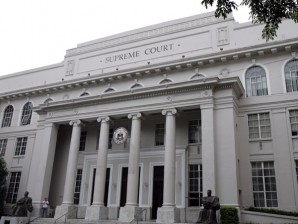SC junks amparo plea from relatives of theft suspect
MANILA, Philippines—The Supreme Court denied the writ of amparo petition filed by relatives of a theft suspect who disappeared four years ago.
In a 15-page decision, the high court through Associate Justice Mariano Del Castillo set aside the July 24, 2008 decision of the Malolos City Regional Trial Court Branch 20 that issued the writ of amparo and ordered the production of the body of Benhur Pardico who was last seen on March 31, 2008.
Pardico, together with Enrique, Lapore was taken by Security Guards Edgardo Navia, Ruben Dio and Andrew Buising in 2008 after they received a complaint that Pardico and Lapore have been involved in theft of electrical wires at a subdivision. The two signed a waiver at the subdivision security logbook that they were released unharmed. However, Pardico was never seen again.
The high court, in dismissing the petition, said there is no government involvement in the case.
It explained that in a writ of amparo case, government involvement in enforced disappearances and extra-legal killings is an indispensable element.
Article continues after this advertisement“Indispensable element of State participation was not present in this case. It held that the petition does not contain any allegation of State complicity, and none of the evidence presented tend to show that the government or any of its agents orchestrated Ben’s disappearance. In fact, none of its agents, officials, or employees were impleaded or implicated in amparo petition whether as responsible or accountable persons.”
Article continues after this advertisement“Thus is the absence of an allegation or proof that the government or its agents had a hand in Ben’s disappearance or that they failed to exercise extraordinary diligence in investigating his case, the Court will definitely not hold the government or its agents either as responsible or accountable persons,” the high court held.
Under Section 1 of AM No. 07-9-12-SC, The Rule on the Writ of Amparo, a writ of amparo may lie against a private individual or entity. However, the court underscored that even if the person sought to be held accountable or responsible in an amparo petition is a private individual or entity, still, government involvement in the disappearance remains an indispensible element.
“It is now clear that for the protective writ of amparo to issue, allegation and proof that the persons subject thereof are missing are not enough. The petitioner in an amparo case has the burden of proving by substantial evidence the indispensable element of government participation,” the high court said.
